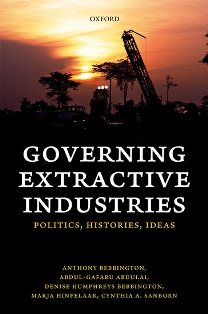Researching the politics of development
Blog

An excerpt from Governing Extractive Industries – Resource Extraction and Inclusive Development

22 August 2018
This exciting new book is drawn from ESID research on natural resource governance that began in 2012. The book’s chapters cover: resource extraction and inclusive development, before looking at specific examples in Peru, Bolivia, Zambia and Ghana. Political settlements, competitive clientelism and political economy are also analysed. In this extract from Chapter 1, the authors introduce their approach to resource extraction and inclusive development
The large-scale extraction of minerals, hydrocarbons, and other natural resources1 has long been central to national economies and the global economy. This has been the case in colonial and post-colonial economies alike, and the harnessing of such resources continues to feature prominently in the economic development strategies of many countries. The economic significance of resource extraction can be quantified through data on percentage contribution of oil, gas, and mining to GDP, exports, foreign direct investment, and the public budget (Mosley, 2017). In contrast, the contributions of extractive industries to ‘development’ and ‘inclusive development’ are more uncertain, not least because definitions of these terms differ based on the degree to which analysts emphasize goals of poverty and income inequality, environmental justice, gender equity, or human and citizenship rights. Even those advocating for the role of extractives in economic development and poverty reduction recognize that results have often been ambiguous (Davis, 2009). These observations have inspired much discussion of the factors explaining such disappointments, a series of policy recommendations regarding how to improve the contributions of resource extraction to development, and significant advocacy and social conflict surrounding the extractive economy across the globe (see Ross, 2015).
Much of the discussion regarding how to manage resource extraction more effectively has emphasized the importance of institutions and governance (Karl, 1997, 2007; Humphreys et al., 2007). Disappointing development outcomes in economies with substantial extractive activity have been explained in terms of the ‘poor quality’ or ‘weakness’ of institutions existing prior to and (p.2) during the growth of investment in mining and hydrocarbons, as well as the adverse impacts of a growing extractive economy on institutional quality (Weber-Fahr, 2002; Robinson et al., 2006; Humphreys et al., 2007; Davis, 2009; Ross, 2015). Such centring of institutions in explanations of poor performance has also meant that many proposals for change have emphasized the need for new, improved, and strengthened institutions. The sorts of institutions proposed are diverse, often depending on the most pressing concerns of the commentator. These can include: institutions and processes for free, prior and informed consent (FPIC); sovereign wealth funds to manage resource rents without distorting incentives; transparency institutions ranging from subnational government oversight to the global Extractive Industries Transparency Initiative (EITI); and tax codes to reallocate benefits along the value chain and among stakeholders.2 While such proposals each have their logic, they tend to say less about the conditions that would need to exist for such institutional changes to come into being, be sustained over time, and be effective.
Of course, there is only so much that any particular act of analysis or advocacy can achieve, but it remains important to explore the conditions under which institutions affecting natural resource governance have emerged. The literature on institutional change suggests that political, ideational, and bureaucratic factors are all likely to matter (Mahoney and Thelen, 2010). While much of this literature invokes exogenous drivers of change, drivers can also be endogenous to the institution and the geographical and social units that it governs (Bebbington et al., 2008; Mahoney and Thelen, 2010; Berdegué et al., 2015; Ospina et al., 2015). Regardless of whether drivers are primarily exogenous or endogenous, historical precursors are likely to affect the possibility of, and form taken by, such processes of emergence (Mahoney and Thelen, 2010; Thorp et al., 2012; Bebbington, 2013b).
This book synthesizes lessons from research enquiring into the drivers of institutional change in extractive industry governance over time and in different geographical contexts, and the implications of these governance arrangements for patterns of social, political, and economic inclusion. The project paid special attention to the political drivers of institutional change. We are certainly not the first to step into this terrain, and there is already a strong scholarly literature addressing the political dimensions of extractive industry governance (e.g. Karl, 1997; Leith, 2003; Le Billon, 2005; Robinson et al., 2006; Rajan, 2011; Mitchell, 2012; Ross, 2012; D’Argent et al., 2017). Our intended contribution is to take insights from such authors and explore what might be gained by reading the politics of resource extraction through a theoretical framework that grows out of the literature on political settlements and national developmental trajectories (Hickey, 2013; Hickey et al., 2015).
Governing Extractive Industries: Politics, Histories, Ideas is an open access title, which means it is free to read at Oxford Scholarship Online and offered as a free PDF download from OUP.
